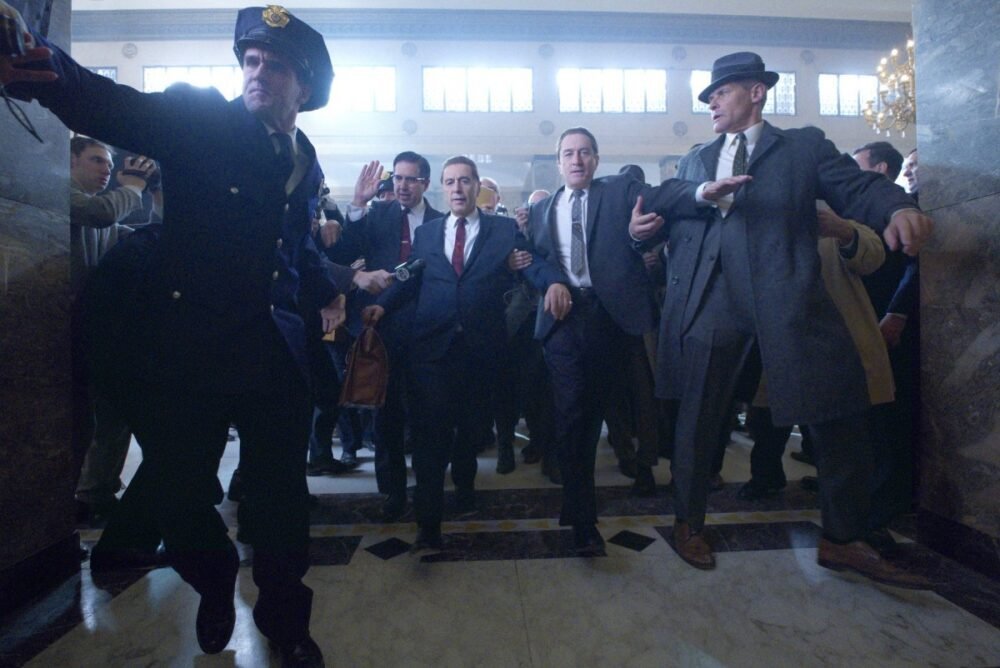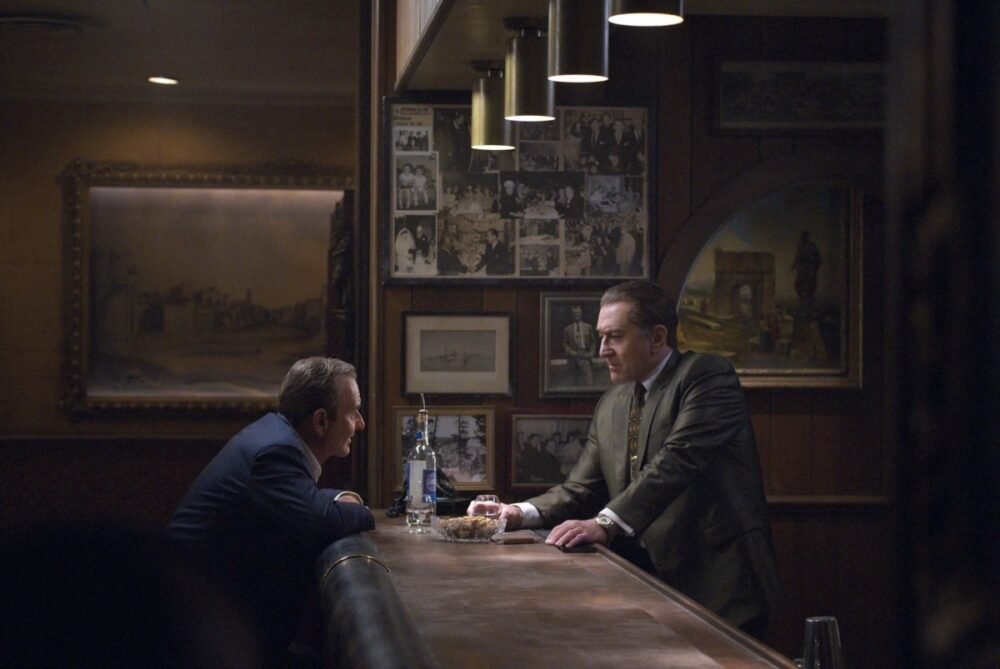The Irishman: a review

Martin’s back at it again. We decided to sit down quietly and watch the 3hours and 29 minutes of movie: The Irishman by Martin Scorsese. And, it was all worth it in the end.
The title could fool you. I’m not going to lie: it’s not exactly that Irish though. Joke aside, based on Charles Brandt’s novel, I Heard You Painted Houses, The Irishman captivated a large crowd of viewers and movie-lovers. By exhuming big gangster movie stars from DeNiro to Al Pacino, passing through Pesci and Harvey Keitel, Scorsese did it again. He perfectly conveyed a feature film, albeit a really long one, but in the lightest way. Although the length can really foreshadow a great mental commitment, an effort equal to sitting an exam at university, The Irishman makes no qualms about introducing the viewer to the schemes of great businessmen colluding with the mob royalty.
On the one hand, this may be defined as a brief history of the United States in the post-war period seen through the eyes of the mafia, or rather, of mobsters. On the other, it is a eulogy to a world that died. A melancholic and poignant world which, in the end, is founded on violence, greed and betrayal. The entire story is stirred together by a sense of humour that often touches on the absurd, to make even more ordinary the paradox of this war veteran hired by the American Cosa Nostra for his skills as a conscientious and impassive killer, as well as being an affectionate husband and good family man (a De Niro of monumental kindness shaken by flashes of cruelty).
The Irishman chronicles the life and times of Frank Sheeran, a veteran from the second world war, whose story intertwines with that of notorious Teamsters head Jimmy Hoffa.
Frank Sheeran, being known as the Irishman, did not come from the Emerald Isle. He came from an Irish household, but there is very little Irish in him. However, the undoubted trait of such devotion to family values, the priority of being a good Christian, seems to stand out. Born and raised in Philadelphia, Sheeran comes into contact with the famous Bufalino family, mobsters by birth, and with their boss Russell Bufalino, played by a placid Joe Pesci. Bufalino, in turn, introduces him to the influential businessman Jimmy Hoffa, who takes Sheeran under his wing.

Scorsese’s signature can be perceived immediately, from the very first scene that recalls the series of shots juxtaposed from his other great film Goodfellas. If in Goodfellas we found ourselves being carried hand in hand through the corridors of the vibrant and lively Copacabana club, in The Irishman Scorsese instead leads us through the halls of a nursing home in the ‘80s when we meet Frank Sheeran later in life, in the stillness of his wheelchair.
[wpdevart_youtube]OJEEVtqXdK8[/wpdevart_youtube]
[wpdevart_youtube]xrmAUTMs66M[/wpdevart_youtube]
The timeless Pesci-DeNiro duo, intriguers and mafia slaughters one again thanks to Scorsese’s skillful camera work, is once again reunited on the big screen accompanied by a solemn and unmissable Al Pacino. The high profile character Jimmy Hoffa, of such notoriety to be compared in the film, in terms of popularity, to the Beatles, could only be portrayed by the charismatic figure of Pacino. He appears without a wrinkle and without smudges, from the charges of which he was accused by the then General Prosecutor Robert Kennedy to the death inflicted by his most trusted collaborator, Sheeran himself.
Yet, in this distant chaos, the cornerstones of almost romantic ideals stand out, filled with trust and respect. As in any respectable mafia story, the ideals of family, alliances and brotherhood are the fundamental principles on which the characterization of the various identities is based. It is more than clear that Scorsese was well aware of this as he does not fail a single hit in depicting the friendship of these three men and the total trust that one had in the other. A trust so blind that leads Hoffa to lower his guard so much that he finds himself, inevitably dead. And this is precisely the tragicomic story of the mafia love drama.

If Scorsese had ended The Irishman before the three hours had elapsed, we would have had to inevitably complain, as if he had not respected his inexorable parameters. But the director lets the story continue beyond its natural climax, telling what happens after the most adrenaline-pumping scenes. Everything slows down. The characters age. Some conflicts can’t be solved. Scorsese insists on making us the witness of their pain in the winter of life.
It looks as if this is the part of the mafia myth that we don’t normally see in films: gangsters without tragedies. The Irishman seems to close Scorsese’s gangster saga, becoming the last missing piece of the puzzle. From Mean Streets where we see the crazy street gang, to Goodfellas following adults and Casino going into details of mafia capitalism, The Irishman brings the hammer down on these characters. It is as if the film forces us to turn back and look at the others in a different light, closing that circle of adventure with the same earnestness of a life cycle about to end.
The end is imminent, however sudden it may be. In The Irishman, there is a constant smell of death. Loyalty would be the moral value assumed in the world of men of honour, but betrayal is the norm in which relationships are drowned, in which feelings are narcotized.
The Irishman is available to stream on Netflix and is showing in various cinemas across the country.
[wpdevart_youtube]RS3aHkkfuEI[/wpdevart_youtube]